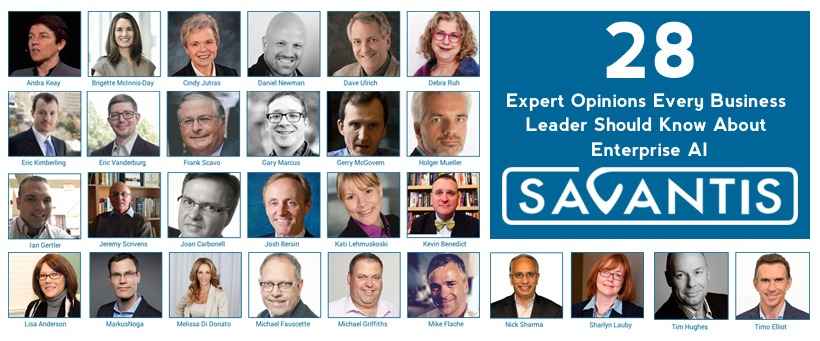Today’s world of digital transformation observes Artificial Intelligence (AI) and Machine Learning (ML) as the most discussed technologies. These disruptive technologies have the potential to reshape enterprises. New capabilities and applications of AI and ML are being realized everyday. And everyone is expecting impact and results.
As an SAP Gold Partner and someone who enables enterprises in transforming digitally, we decided to ask experts the following question:
“According to you, how does artificial intelligence and machine learning impact enterprises?”
Here’s what they said…
A quick note: The opinions of all the experts are their own. Savantis doesn’t share or have any comment on any of their views/opinions.
1.Changing the Nature of Jobs and Work

“Technological innovations (including AI, machine learning, robotics, internet of things, cloud computing, and so forth) are essentially about providing digital information to people and organizations. Any time information changes the nature of competition, technology will enable digital access to information. For example, Amazon, Disney, and hotels track specific customer needs; health care diagnoses; automobiles are self driving; and so forth). When an employee merely transfers information (order taker at fast food who transfers customer request to computer order), the job will be automated. This changes the nature of jobs and work.”
Dave Ulrich
Rensis Likert Professor, Ross School of Business, University of Michigan
Partner, The RBL Group
Twitter | LinkedIn
www.RBL.net
2. AI and ML Will Make Decisions Easier, Faster, and More Accurate

“Artificial Intelligence has the potential to revolutionize almost every business process at work. Every decision we make: who to hire, how to sell, what features to build, what messages to convey – are all made from gut feel, when vast amounts of data are available. Over time AI and ML will bring us recommendations from this data, and we will find these decisions to be easier, faster, and more accurate.
On the downside, we have to remember that AI algorithms are new and are very dependent on data. So we have to learn how to spot bias, inspect how the systems work, and find ways to audit them so the “robot analysis” becomes better and we don’t do the wrong thing. Yes, AI will introduce bias and some errors into the business world – so our next big challenge is decipher these systems and make sure we know why they do what they do.”
Josh Bersin
Global Industry Analyst, HR and Workforce Technology
Twitter | LinkedIn
www.joshbersin.com
3. Focus on Aligning with Organizational Goals

“Whenever an organization is considering a new technology, they have to ask themselves “What’s the goal?” Not just because, at some point, the organization will want to measure the return on investment; but because the goal drives what technology is chosen, how it’s implemented, and most importantly, how people will use it.
As organizations continue to focus on their workforces – in terms of finding, engaging and retaining the best talent – they also have to look at tools like artificial intelligence and machine learning. Both bring many advantages to organizations. Some are proven – like chatbots in the recruiting process. And others are new – like machine learning in approving employee requests for time off. Either way, companies need to always stay focused on aligning technology with organizational goals.”
Sharlyn Lauby
President, ITM Group
Twitter | LinkedIn
http://www.hrbartender.com/
4. 2018-Vintage AI: Long Way from Matching Flexible Intelligence of People

“AI will eventually change practically everything in enterprise, but the current word of the day is “hype.” Sure, current, 2018-vintage AI can solve a bunch of problems that involve pattern classification (e.g. speech recognition and photo tagging), but it’s also basically illiterate, completely unable to read complex documents. As exciting as current AI is, we can’t really trust it yet in mission-critical problems; robotics in open-ended environments with human beings is also pretty much out of the question. We have come a long way in solutions to narrow problems with lots of data, but for now anyway, machines are long way from matching the flexible intelligence of people.”
Gary Marcus
Founder and CEO, Geometric Intelligence [acquired by Uber]
Professor of Psychology and Neural Science, NYU
Twitter | LinkedIn
www.garymarcus.com
5. AI and ML can Create New Dimensions of Value Creation

“Artificial intelligence (AI) and machine learning (ML) are considered to be the most disruptive technologies when it comes to transformation and digital growth in enterprises. For example, it enables them to setup real-time analysis infrastructures that not only process large amounts of data intelligently, but also do so in a much shorter time. With proper use, AI and ML will not only improve business efficiency, but it can also help employees focus on their skills, and thus create new dimensions of value creation. One such example is ‘Social Listening’. AI and ML enables sales and marketing teams to find new ways to understand their customers’ needs, leverage leads through social media, and significantly enhances the quality of engagements.”
Mike Flache
Business Angel and Investor
Twitter |LinkedIn
http://www.mikeflache.com
6. AI and ML Intelligently Act Upon the Most Valuable Asset – Data

“Enterprises have begun to sit up and realise that data is one of their most valuable assets, and intelligently acting upon and using this data is now fundamental – this is where artificial intelligence and machine learning comes in. The real value of these technologies lays in their power to help us understand information and make decisions in a fraction of the time they took before, empowering business processes and maximising opportunities, bringing significant productivity benefits. Crucially for the enterprise, AI is displacing mundane tasks and freeing up employees to be more creative.”
Melissa Di Donato
Chief Operating Officer, SAP Digital Core
Twitter | LinkedIn
http://www.sap.com/products/s4hana-erp.html
7.Technological Possibilities that have Not Yet Reached their End

“Machine learning (ML) is about to become a common part of enterprise software, but the technological possibilities have not yet nearly reached their end. The intelligent enterprise powered by ML assists in all core activities, takes actions for repetitive end-to-end tasks and is conversing with humans in natural language. Conversational AI and chatbots can revolutionize customer service by providing faster resolutions, being available 24/7, and reducing workload so employees can focus on higher-value tasks. Algorithms embedded into business application speed up the implementation of ML and augment processes with machine intelligence. ML platforms that come with pre-trained and customizable service APIs provide a solid basis to model ML in individual ways and scale it like never before while saving development or maintenance costs.”
Markus Noga
Senior Vice President Machine Learning, SAP SE
Twitter | LinkedIn
www.sap.com/ml
8. AI for Systematic and Process Roles While Humans for Customer Service

“Artificial intelligence and machine learning will certainly impact the way enterprises do business into the future. We are all looking at ways to become more efficient, cut costs and see how we can use AI instead of humans.
Major banks have Automatic Tellers and IPads do more than ever before which has removed the need for people. McDonalds has self-serve kiosks to place your order. Bots are talking to us more and more when we visit websites. This is all great, but I still believe we need to make sure we have human elements. People enjoy talking to other people. People buy from those they know, like and trust, so if that human element is removed it could affect sales.
I see AI being used for systematic and process roles, while humans being used for customer service, sales roles going forward.”
Michael Griffiths
Founder, Referral Marketing Guru
Twitter
www.referralmarketingguru.com.au
9. Future of Business: Self-Optimizing Business Systems

“The future of business is self-optimizing business systems. Thanks to the internet of things and more powerful computing platforms, organizations can now gather vast amounts of real-time insights into every aspect of modern business. Machine learning algorithms can then use complex pattern-matching to turn that data into iteratively-improving outcomes. The ultimate result is that all business processes, products and services will improve automatically over time and as people use them.”
Timo Elliott
VP, Global Innovation Evangelist for SAP
Twitter | LinkedIn
http://timoelliott.com/
10. Connect the Dots Between People, Processes and Technology to Drive Results, Outcomes and Value

“When many people think about artificial intelligence (AI) and machine learning, they imagine robotic-like masters that cut people out of the equation and take over the world. Innovation isn’t going to stop, but we must remember that technology is not the solution. Instead, it’s a catalyst that helps people to solve challenges and capture opportunities. It’s about impact and outcomes. For enterprises, AI and machine learning are automating processes, driving efficiency (to some degree) and uncovering insights.
This curiosity and discovery is a core area of innovation, passion and humanity. Algorithms and machines are supposed to augment intelligence, enabling more productive and strategic results to emerge. These cannot occur in a bubble though. Emerging technologies should connect and reinforce vs sitting isolated and alone as shiny objects—think the API and IoT era, with a dose of AI. As enterprises learn and teach how to leverage AI and ML as an enabler, it empowers internally and propels crucial areas externally like customer experience. Enterprises must embrace, adapt, build and focus on making their core (people) better and more valuable each day, while ensuring that data protection, privacy and cybersecurity are all foundational elements vs afterthoughts. Machines and intelligence will help that, but the result is about connecting the dots between people, processes and technology to drive results, outcomes and value without compromising any of them. Exciting (and challenging) days ahead!”
Ian Gertler
CMO, Symplegades
Advisory Board, IoT Community
Twitter | LinkedIn
11. Human and Machine Will Maximize the Potential of Data Together
“The future of the enterprise will be enriched by human-machine partnerships that enable people to grow into roles of performing more critical business tasks while allowing machines to handle both mundane and complex tasks that do not benefit from the value of emotional intelligence. The important thing for enterprises to consider is it isn’t about human or machine, it is human AND machine that will maximize the potential of a world rich with data and endless with opportunity.”
Daniel Newman
Principal Analyst and Founding Partner at Futurum Research + Analysis
Twitter | LinkedIn
http://futurumresearch.com/
12. AI and ML Will Impact Every Process Based on Data

“At every step in every business process where decisions, based on data, are made – the adoption of AI and machine learning will have a significant impact.
If there is a documented best practice for how a process should flow, and how a decision should be made based on data inputs, then these will be codified and automated via RPA, AI and supported by machine learning. In addition, as more and more of our interactions with customers, employees and partners become digital, the expectation for real-time, instantaneous responses also increase, which makes it increasingly necessary to respond via intelligent (AI) supported systems to meet our real-time expectations.”
Kevin Benedict
SVP, Solutions Strategy @Regalix, Thought Leader, Tech Analyst
Twitter | LinkedIn
http://www.regalix.com/
13. Automated Tasks and Supported Business Operations With AI

“There is a lot of noise around AI/ML and how it can be a transformational technology for businesses. Sometimes, maybe a lot of times lately, that noise can be very distracting and make business leaders think that the promise is much greater than the reality of what can be done. AI isn’t new, but the scope of use cases have changed and grown. The core of any AI solution is data, and because of the Internet and the explosion of readily available data, the promise of using AI/ML inside many typical enterprise systems is very high. The technology can be used in several ways, but primarily today solutions focus on 1. automation of tasks and 2. supporting business decisions by making sense out of large amounts of data that would otherwise be nearly impossible for humans to use effectively.”
Michael Fauscette
Chief Research Officer, G2 CROWD
Twitter | LinkedIn
www.g2crowd.com
14. Digitize Core Processes and Take Better Leverage of AI And ML

“Business and IT leaders across industries are constantly searching for new and innovative ways to service and delight customers like no other competitor. We at Savantis strongly believe digitized processes will be differentiators in the Digital Economy. What we see currently is merely a speck of the possibilities with Artificial Intelligence and Machine Learning. At Savantis, we’re working with Enterprises across industries to leverage modern analytics as a foundation for digital enterprise, digitize the core processes with SAP S/4HANA, C/4 HANA and take better leverage of AI and ML across the enterprise to augment, automate processes and turn digital aspirations to reality.”
Nick Sharma
CEO, Savantis Solutions LLC
Twitter | LinkedIn
https://savantis.com
15. AI Aiding In Decision-Making, Customer Service, Operations, Predictive Analytics and More

“AI and ML provide the opportunity to transform many enterprises. Ultimately, it must solve a business problem or enhance a business process for it to be adopted. We are seeing AI aiding in decision-making, customer service, operations, predictive analytics and many other areas. Those with big data are seeing significant utility in AI and IoT is fueling new data for AI to consume.”
Eric Vanderburg
Vice President of Cybersecurity at TCDI
Security and Technology Thought Leader, Consultant and Author
Twitter | LinkedIn
www.tcdi.com
16. Artificial Intelligence and Machine Learning Will Become More Mainstream

“AI and Machine Learning will become more “mainstream” as time goes by. There are already standard off the shelf algorithms and machine learning which have been added to everyday applications. For example, as the buying process changes, companies realise that the website becomes less relevant, which is why social media listening/intent data systems become more important. Such applications have AI and Machine learning already as standard.”
Tim Hughes
Co-Founder and CEO
Digital leadership Associates
Twitter | LinkedIn
http://www.social-experts.net/
17. Quicker, Informed Decisions and Better Met Customer Needs With AI

“Artificial Intelligence and Machine Learning can bring benefits to the business enterprise that include innovation, operational and productivity efficiencies. This technology can also allow teams to make quicker and more informed decisions, and at the same time help create products and services that better meet the needs of your customers.
As these new technologies continue to evolve and impact human-decision without a strategic plan they can also create regulatory risks and create ethical issues. However, the benefits outweigh the risks when considering disenfranchised workers like community of persons with disabilities because these technologies can reduce some of the current barriers including transportation, communications, access, and processing issues.”
Debra Ruh
CEO of Ruh Global Communications
Twitter | LinkedIn
http://www.ruhglobal.com/
18. Automation for Efficiency and Augmented Connections for More Human Work

“We are living in a time when there are fundamental shifts in the way work is being done. Two themes are emerging and are in tension.
Firstly, work being done now will be taken over by automation and robots as society searches for new ways to achieve efficiency, speed and quality at scale. We might call this the first stream which is about the head, not the heart. This way is supported by the big technology providers, concerned with efficiency and automation. In this stream, people are seen as cogs in a manager’s machine and AI is used to find ways to replace people.
But there is a second stream emerging now. This is about the human need for augmented connections between people as they engage in open collaboration for humanity’s causes. The second stream says that there will be meaning in work which engages your personal life-work – why you exist. This stream deploys AI to support your individual life-work journey and openly connects you with people who share your life-work cause for contributing or giving to make the world a better place. The first stream takes away work from humans, the second streams augments what it is to be fully human at work.”
Jeremy Scrivens
Director at The Emotional Economy at Work
Twitter | LinkedIn
http://emotionaleconomy.com.au/
19. Digital Transformation 2.0 is Getting Possible

“AI / ML are the most fundamental technology change that enterprises have seen since the beginning of computing itself. What is getting possible is Digital Transformation 2.0, which is the transformation of digital enabled processes into pure software / AI based processes, powered by the digital exhaust of users. Effectively know how that’s in the brains of people, is moving into the brains of software.”
Holger Mueller
Principal Analyst & VP, Constellation Research, Inc.
Twitter | LinkedIn
http://enswmu.blogspot.com/
20. Combining Human and Artificial Intelligence for Results

“Artificial intelligence is transforming how companies are organized by creating a symbiosis between people and technology. AI can preprocess the data, generate information drafts, elaborate forecasts and launch alerts. Skilled individuals then validate AI results and focus their time on decision making, problem solving and giving feedback to improve future predictions. We don’t need to wait until AI is perfect. By combining Human and Artificial Intelligence companies can start getting results right now.”
Joan Carbonell
Innovation, IT & Digital Transformation Strategist
Twitter | LinkedIn
http://joancarbonell.com/
21. With Poor Quality Data, AI is Just ‘Garbage-In, Garbage-Out’

“Artificial intelligence and machine learning can easily become artificial ignorance and machine stupidity. None of these systems are neutral. They inherit the cultural norms and work practices of those who create them. And if the data on which they feed and learn is of poor quality, it’s still a ‘garbage-in, garbage-out’ artificial world.”
Gerry McGovern
Founder, Customer Carewords
Twitter |LinkedIn
http://www.customercarewords.com/
22. Just Started to Scratch the Surface in their Impact on Organizations

“Based on our experience with SAP and other ERP systems, machine learning and artificial intelligence has just started to scratch the surface in their impact on organizations. Some systems are starting to build machine learning into their core offerings – much of which is transparent and behind the scenes. For example, S4/HANA’s ability to “learn” exceptions to regular A/P processes. As AI and machine learning continue to evolve and user adoption increases, I suspect the impact will grow over time.”
Eric Kimberling
CEO and Founder
Third Stage Consulting Group
Twitter | LinkedIn
www.ThirdStage-Consulting.com
23. Transformative for Organizations Who Can Identify When and How

“Artificial intelligence and machine learning is going to be transformative for organizations who can identify when and how to apply the technologies. A smart organization will also consider the deployment of robots as part of their AI strategy, because robots both collect more data, AND provide more opportunities to take action or manipulate the environment based on the data that your AI is interpreting. At Silicon Valley Robotics (http://svrobo.org) we help you separate the signal from the noise and find the latest robotics and AI technologies.”
Andra Keay
Managing Director of Silicon Valley Robotics and Robotics Industry Analyst
Twitter | LinkedIn
http://svrobo.org
24. Positive Return on AI Investments Needed for Full Engagement of the Enterprise

“New technologies which we don’t yet understand seem like magic to us. As the technology improves, things we would have called artificial intelligence few years back are often just plain algorithms. This should not be interpreted as lack of profitable opportunities for enterprises on artificial intelligence. On many industries such as on online retail, machine learning is a must have for better understanding customer behaviour and making changes accordingly. After using machine learning to understand the customer, one possible step further would be to automate making changes based on the machine learning results. It’s important to have fast results and positive return of investment or ROI on artificial intelligence investments to ensure full engagement of the enterprise on next steps.”
Kati Lehmuskoski
Senior advisor at Sofigate
Twitter | LinkedIn
http://www.underthehood.fi/
25. AI And ML: Not a Matter of Doing New Things but Doing Things Better

“Although AI and machine learning sound like science fiction, their impact on businesses for the most part is just incremental improvement. For example, an insurance company may use machine learning to make better underwriting decisions. Or, a credit card issuer may use it to more quickly detect fraud. Or an online retailer might use it to make better recommendations based on shopping patterns. Or, a large healthcare organization might use it to reduce attrition of skilled nursing staff. So, it’s often not a matter of doing new things, but doing things better.”
Frank Scavo
President of Strativa, a management consulting firm
Twitter | LinkedIn
http://strativa.com
26. AI and ML Will Help Drive Better Business Outcomes With Intelligence Faster

“Just like employees, Artificial Intelligence (AI) and Machine Learning (ML) impact enterprises by driving business outcomes, increasing revenue and customer satisfaction. With 60% of human tasks being automated by 2025, employees can work more with qualities that make them human, such as empathy, creativity and inspiring leadership. Particularly in the HR Tech space, employees will have the opportunity to shift their focus on problems that matter like Diversity & Inclusion, Health & Well-Being and Communication. In turn, AI and ML will help enterprises drive better business outcomes with intelligence faster.”
Brigette McInnis-Day
COO, HR Strategy & Digital Transformation at SAP Success Factors
Twitter | LinkedIn
www.successfactors.com
27. Better Service and Increased Margins

“AI and machine learning will have a profound impact over the next few years! For example, instead of following preventative maintenance schedules according to a rolling calendar which is likely to create unnecessary machine downtime while not resolving all of the unexpected machine breakdowns, AI can flip this equation on its head!
Machine learning collects data from the machine so that preventative maintenance efforts can be targeted on what is most essential and imminent, thereby minimizing unnecessary downtime while avoiding the majority of breakdowns. As these programs are rolled out, customer service and margins will increase.”
Lisa Anderson
President, LMA Consulting Group Inc.
Twitter | LinkedIn
http://www.lma-consultinggroup.com/
28. Understand the Possibilities Today and the Future Trajectory

“AI – the technology that can make enterprise applications smart is no longer the stuff of science fiction. However, vendors have just begun to leverage these technologies to make their solutions intelligent. Some are moving faster than others. While this transition is underway, the first order of priority is to better understand the possibilities that exist today and the trajectory of where applications are going in the future.”
Cindy Jutras
President, Mint Jutras
Twitter | LinkedIn
http://www.mintjutras.com/blog/
How Savantis is Transforming Enterprises
Savantis is working closely with enterprises across different industries like hospitality, entertainment, retail and manufacturing to help them digitize their core processes with cloud ERP solutions like SAP S/4HANA. By leveraging artificial intelligence and machine learning, we are augmenting human capabilities and automating processes to deliver improved efficiencies.
Our offerings:
- Digitize your business with SAP S/4HANA now.
- Personalize your guest experiences with SAMMY.



